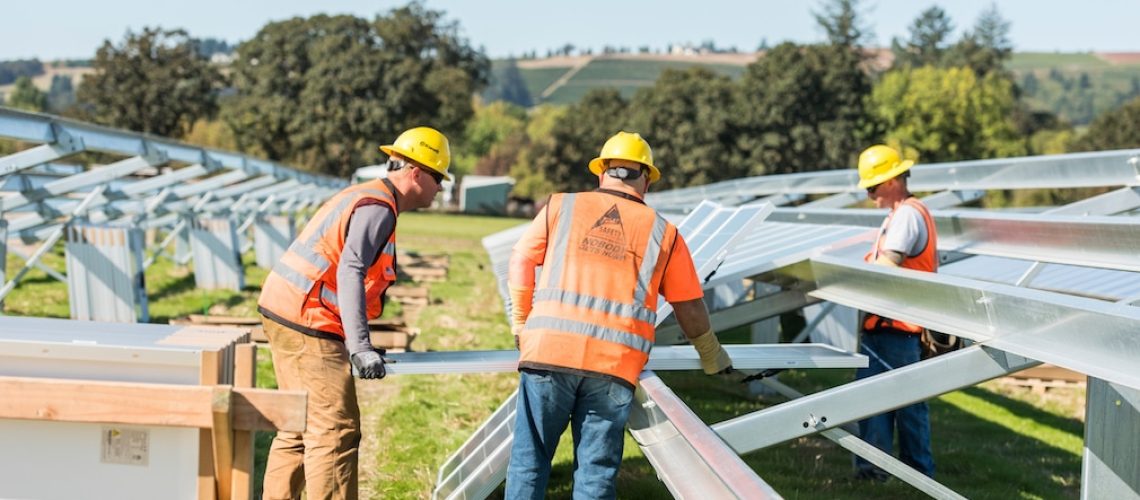The reconciliation bill, which carries full Democratic support in the Senate, carries $370 billion in energy security and climate spending.
The Inflation Reduction Act of 2022 has full Democratic support in the Senate and may face a vote as early as next week. It is expected to be passed with a 50-50 split using the Senate powers of reconciliation. The provision is “long overdue and a necessary step to ensure the United States takes decisive action on the climate crisis that helps our economy and provides leadership for the world by example,” said former Vice President Al Gore.
The bill aims at lower energy costs for Americans, energy security, decarbonization of all sectors of the economy, environmental justice, and resilience in rural communities.
Lower consumer energy costs
Lowered consumer energy costs will be targeted through direct incentives for energy efficient and electric appliances, clean vehicles, rooftop solar, and more. It contains $9 billion in consumer home energy rebate programs, focused on low income households, to electrify appliances and make energy efficient retrofits.
Ten years of investment tax credits were extended, including 30% for residential rooftop solar costs, and credits for electric HVAC and water heaters. A $4,000 consumer tax credit for low/middle income individuals to buy used clean vehicles, and up to $7500 for new clean vehicles. It will allocate $1 billion for a grant program to make affordable housing more energy efficient.
Domestic manufacturing
Domestic manufacturing provisions are central in this bill. Production tax credits, roughly $30 billion, will be assigned to U.S. manufacturing of solar panels, wind turbines, batteries, and critical minerals processing. And, $10 billion in investment tax credits will be distributed for facilities that make EVs, wind turbines and solar panels.
The Defense Production Act holds $500 million for heat pumps and critical minerals processing, and $2 billion in grants will be used to improve existing auto manufacturing facilities to create clean vehicles like EVs and hybrids. Along with these funds will be up to $20 billion in clean vehicle manufacturing credits. About $2 billion will be given to national labs to accelerate breakthrough energy research.
Economy-wide decarbonization
A good portion of the funds will be used to decarbonize every segment of the economy. Tax credits for clean electricity and energy storage will be distributed and roughly $30 billion in grant and loan programs will be given to states and electric utilities to accelerate the energy transition.
Almost $6 billion will support a new Advanced Industrial Facilities Deployment Program to reduce emissions from the largest industrial emitters, like chemical, steel, and cement plants. Over $9 billion will support federal procurement of American-made cleantech, creating a stable market for such products. The U.S. Postal Service will have a $3 billion budget for zero-emission vehicles.
Environmental justice
Environmental justice is another pillar of the legislation. A $27 billion clean energy technology accelerator program will support deployment of technologies to reduce emissions in disadvantaged communities. Funded at $3 billion, Environmental and Climate Justice Block Grants to invest in community led projects and address disproportionate environmental and public health harms related to pollution and climate change.
The $3 billion Neighborhood Access and Equity Grants are designed to support neighborhood equity, safety, and affordable transportation access with 4 competitive grants to reconnect communities divided by existing infrastructure barriers, mitigate negative impacts of transportation facilities or construction projects on disadvantaged or underserved communities, and support equitable transportation planning and community engagement activities.
Airport air pollution reduction efforts will be funded at $3 billion and $1 billion will be dedicated to clean heavy-duty vehicles like school and transit buses and garbage trucks.
Agricultural and rural support
The agricultural industry and rural communities are supported in the bill as well. More than $20 billion will be dedicated to “climate-smart” agriculture practices. About $5 billion in grants will be used to support healthy, fire-resilient forests, forest conservation, and urban tree planting.
Tax credits and grants will be paid to support domestic biofuel production and to build the infrastructure needed to support sustainable aviation fuel and other biofuels. To support and conserve coastal habitats and the communities that depend on them, $2.6 billion in grants will be available.
“Now, let me be clear: This bill would be the most significant legislation in history to tackle the climate crisis and improve our energy security right away. And it’ll give us a tool to meet the climate goals that are set — that we’ve agreed to — by cutting emissions and accelerating clean energy. A huge step forward,” said President Joe Biden.
The largest climate and energy package in United States history will be funded by closing tax loopholes on the ultra-wealthy and corporations. “This bill requires the largest corporations to begin to — begin to pay toward their fair share of taxes by putting in place a 15 percent corporate minimum tax,” said Biden.



